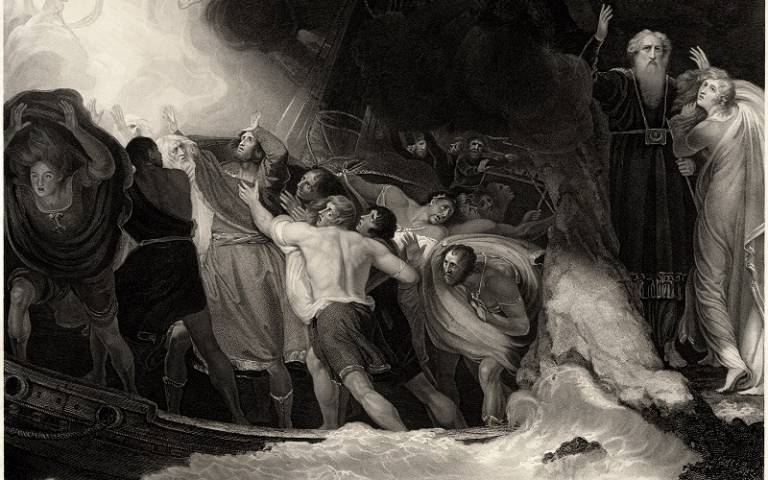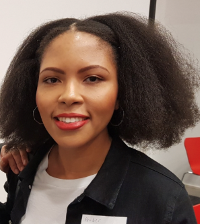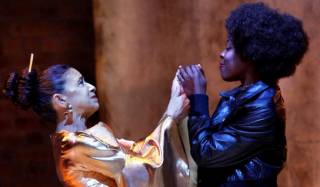The Northcliffe Lecture 2022
Professor Emma Smith (Oxford University): Asylum in Illyria: Shakespeare and Migration
Tuesday 13th December 5.30-7.00pm
This is a free event that will also be live streamed via zoom but booking is required for both attendance in person and online.

The Northcliffe Lecture is an annual lecture on a literary topic by a leading critic or writer. Hosted by the UCL English Department, it is intended for the widest possible audience of those, both within UCL and outside it, who have an appetite for Literature. We are delighted that this year’s lecture will be given by Professor Emma Smith, of Oxford University. Her topic is ‘Asylum in Illyria: Shakespeare and Migration’ . Professor Smith is a world-renowned Shakespeare scholar, who has published on topics such as Shakespeare’s First Folio, women on the early modern stage, and Shakespeare’s sources. She is also a well-known broadcaster and podcaster, and her 2019 book, This Is Shakespeare, has reached a large general readership. Her most recent book is Portable Magic: A History of Books and their Readers, published earlier this year.
Race, Power, and Poetics Seminar
Natalya Din-Kariuki - Edward Terry, India, and ‘Improvement’ in the Seventeenth Century
Monday 21st November: 5.00-6.00pm:
Scholars of legal and economic history including Brenna Bhandar, Paul Slack, and Craig Muldrew have demonstrated the extent to which the idea of improvement – an idea that emerged in the seventeenth century – shaped the structures of colonialism and capitalism and their attendant racial logics. This talk focusses on a specific episode in the history of that idea. It does so in reference to Edward Terry, a chaplain attached to one of the most significant embassies of the early modern period, that of Thomas Roe at the Mughal court of Jahangir in 1616-19. By examining Terry’s digressive and sometimes ekphrastic travel writing and preaching, which repeatedly asks English readers and listeners to ‘improve’ what he has written, the talk considers the relationship of economic, spiritual, and rhetorical notions of profit and their implications for our understanding of England’s early encounters with India.
Natalya Din-Kariuki is Assistant Professor in the Department of English and Comparative Literary Studies at the University of Warwick. She is currently working on a book about ideas of “place” in seventeenth-century travel writing. Material from this project has been published in The Review of English Studies and in Travel and Conflict in the Early Modern World ed. Gábor Gelléri and Rachel Willie (Routledge, 2020). She also has an essay on the English clergyman Lancelot Andrewes forthcoming in The Huntington Library Quarterly. With Subha Mukherji and Rowan Williams, she is editing Migrant Knowledge, an interdisciplinary volume forthcoming from punctum books which brings together academics, artists, and activists to consider the relationship of migration, knowledge, and form from the early modern period to the present.
Race, Power, and Poetics Seminar
Kelechi Anucha: Racialisation, Recovery, and Form
Monday 14th November: 5.15 - 6.15pm
This paper builds upon work-in-progress PhD material exploring legibility, illness, care and race. Reading across the work of a selection of poets, it examines elliptical, episodic and opaque in prose poetry and poetic form, aiming to probe the multivalence of legibility in relation to health and "dysfunction", its extractive dimensions, and the implications of a failure to be seen or “read” at critical moments.
Kelechi Anucha is PhD candidate on the Wellcome-funded Waiting Times project, a part of the Wellcome Centre for Cultures and Environments of Health at University of Exeter and a member of the Black Health and Humanities Network. Her project examines the relationship between time and care in contemporary end-of-life narratives.
T.S Eliot Society Annual Lecture 2022
17th November, 2022, 5.30pm Gustave Tuck Lecture Theatre
Vivien Eliot – Woman and Writer
The English Department is hosting the 2022 T.S Eliot Society Annual Lecture
Professor Mark Ford will be providing the introduction to the lecture, which this year is delivered by Professor John Haffenden FBA. Professor Haffenden is the Editor of “The Letters of T.S.Eliot”. The 9th Volume (1939 to 1941) was published in 2021. He is Emeritus Professor of English Literature at the University of Sheffield and Senior Research Fellow of the Institute of English Studies at the School of Advanced Studies, University of London.
Race, Power, and Poetics Seminar 31st October 2022, 5-6pm
Dr Sarah Arens (Liverpool): "I'm not tempted by Paris": Poetics, Power, and the Postcolonial Intellectual in Brussels
This online event is part of the Race, Power, and Poetics Autumn 2022 Seminar Series, co-convened by UCL English and the UCL Sarah Parker Remond Centre.
This talk explores the multiple ways in which a range of novels published in the late 90s and early 2000s, by, for example, Patrick François and José Tshisungu wa Tshisungu, engage with global Black politics and the legacy of the anti-colonial politics of Aimé Césaire, Frantz Fanon, and the wider Négritude movement. Their novels describe their role as ‘engaged writers’ and intellectuals in the public sphere of Brussels and engage with the complexity of the situation of the authors and their protagonists, which requires them to constantly re-negotiate their social privilege, acquired by having benefitted from a successful integration into the educational system of the former coloniser.
Dr Sarah Arens is a British Academy Postdoctoral Fellow and incoming Lecturer in French at the University of Liverpool. Sarah's research focuses on fictional and scientific texts, and visual culture, produced during and in the aftermath of Belgian colonialism, as well as science and speculative fiction in French. She is currently finishing a monograph on representations of the city of Brussels in Francophone postcolonial literature for Liverpool University Press.
Professor John Mullan: Adultery in the Novel, from Flaubert to Sally Rooney

Wednesday, 26 Oct 2022, 6.00 - 7.00pm at Gresham College, and online
Adultery became the subject of some of the greatest European novels of the nineteenth century, including Madame Bovary and Anna Karenina. English novels of the period needed adultery for their plots, yet flinched from treating the subject openly.
Through the twentieth century to the present – from Ulysses and A Handful of Dust to recent fiction by Zadie Smith, Tessa Hadley and Sally Rooney – adultery has fascinated novelists. Why is this? And do male and female authors treat adultery differently?
This is part of series of lectures on the Powers of the Novel by John Mullan (Visiting Professor of English Literature). Lectures 1 - 6 are available to watch now.
Professor Helen Hackett Book Launch
5.00-7.00pm on Wednesday 19th October, in the IAS Common Ground (G11, ground floor, South Wing, UCL) and online.
This event will be part of the book launch programme of the UCL Institute of Advanced Studies, in collaboration with the UCL Centre for Early Modern Exchanges. It will be called 'Early Modern Minds' and is a panel discussion: Helen Hackett will be joined by two distinguished guest speakers, Prof Kate Hodgkin (University of East London) and Prof Raphael Lyne (Murray Edwards College, Cambridge). The discussion will be chaired by Shani Bans (PhD candidate, UCL English Department), who conceived the event, and will be followed by drinks and an opportunity to buy The Elizabethan Mind.
Race, Gender & Affect: A Conversation between Xine Yao and Lola Olufemi
Thursday 29th September, 6.30 - 8.00pm, in the IAS Common Ground (G11, ground floor, South Wing, UCL).
In this conversation, Dr. Xine Yao and writer Lola Olufemi discuss what sort of politics are enabled by unfeeling and feeling.
This event is hosted by UCL's Sarah Parker Remond Centre as part of the Perspectives on Racialisation, Gender and Feminist Methodologies Seminar Series 2022-2023 organised by Dr Gala Rexer, Research Fellow at the SPRC.
Radio 4 Extra Broadcast Monday 20th June
The 3rd Degree: Listen to our students take on their professors on Monday 20 June at 3pm. John Mullan (UCL English) representing A&H faces off against student, Nashwa Shah (English Literature). This will be broadcast on BBC Radio 4 Extra and then available on the 3rd Degree webpage.
UCL Graduate Conference Friday 10th June
The UCL English Graduate Conference 2022, Manufacture took place on campus this year on June 10
Race, Power, and Poetics Seminar Series Spring and Summer 2022
Race, Power, and Poetics is a series of events coordinated by Dr Lara Choksey, and Dr Rachel E. Holmes, and Dr Xine Yao. A cross-period examination of the inextricability of its central terms, Race, Power, and Poetics considers the implication of poetic practices and shaping role in racial and ideological dynamics.
Previous events in series:
Amber Lascelles (University of Bristol): “The Dancing Women Move Forward”: Embodied Black Feminist Resistance to Neoliberalism in Tsitsi Dangarembga’s This Mournable Body


In Tsitsi Dangarembga’s acclaimed 2018 novel This Mournable Body, representations of Black women’s bodies lay bare neoliberal myths of racial equality and economic progress. Set in Zimbabwe’s capital Harare in the 2000s, the novel explores narrator Tambudzai Sigauke’s experiences of misogynoir, poverty and poor mental health. This talk argues that in addition to revealing the difficulties of agency, Dangarembga imagines embodied forms of resistance, positioning the solidarity of community as an empowering alternative to neoliberal individualism. This talk is based on a chapter of a monograph-in-progress that traces how writers including Dangarembga, Chimamanda Ngozi Adichie, Dionne Brand and Bernardine Evaristo shape global conversations about Black feminism and use their fiction to reimagine the possibilities of solidarity.
Penelope Geng (Macalester College): Cripping Benefits in Timon of Athens


In act 1, Timon declares “we are born to do benefits” only to discover that in an ablenationalist state like Athens, benefits are available to the exceptional few. What lessons might we draw from the play’s bold depiction of nonnormative and nonproductive embodiment? How have recent productions (staged in this current age of ablenationalism) used casting, costume, music, and design to foreground the text’s representation of disability, race, and civic belonging?
Please see the following links for faculty wide news and events
- Faculty of Arts & Humanities: @ArtsHumsUCL
- Faculty of Social & Historical Sciences: @UCLSocHistSci
- Institute of Advanced Studies (IAS)
 Close
Close

